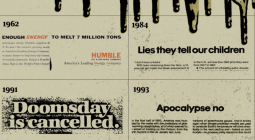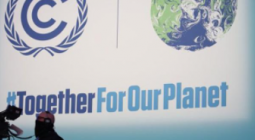Why some of your favorite podcasts are filled with oil company ads

Exxon and other fossil fuel companies are running podcast ads that suggest they are taking aggressive climate action. Climate experts call them greenwashing
If you’re a regular listener of the New York Times podcast The Daily, you would have heard an ad for ExxonMobil’s carbon capture investments more than once in November.
The ad – which coincided with the Cop26 climate summit in Glasgow – told listeners that carbon capture technology could remove more than 90% of CO2 emissions from “carbon-intensive industries” and that the company was working to “deploy this technology at scale”. It gave the sense of an oil company tackling the climate crisis with technology that could solve it – and quickly.
Similar ads have run on NPR podcasts, including Invisibilia and Up First. The American Petroleum Institute has also run ads in podcasts, including on Vox’s Ezra Klein Show (Klein has since left for the New York Times), highlighting that it is “producing more oil and gas while reducing emissions”.
The fossil fuels industry’s sudden interest in podcasts coincides with its recent embrace of social media and newsletter advertising and may well be driven in part by a key difference in the regulation of these “newer” media, regulated by the Federal Trade Commission (FTC), versus legacy print, TV and radio media, which are regulated by the Federal Communications Commission (FCC).
While the FCC actively regulates advertising, the FTC works differently. It generally won’t investigate anything until a complaint is made and even then an investigation is not guaranteed. The FTC has had “green guides” for environmental marketing claims in place for environmental claims for more than 30 years, but the first complaint ever filed against an oil company for greenwashing came in 2021 against Chevron. The action is still pending.
The challenge with the FTC’s guidelines, including the green guides, is that they tend to be product based and specific: your product is either made with recycled materials or not, you either take back and recycle packaging or you don’t. All of which leaves podcast and newsletter publishers and social media platforms to develop their own guidelines and factchecking processes.
This is made harder by the industry’s advertising strategy – oil companies almost never advertise their products, opting instead to advertise ideas, particularly the idea that they’re working hard to address the climate crisis.
ExxonMobil’s ad in The Daily, for example, emphasizes its work to scale up carbon capture as a climate solution. Yet the company currently captures less than 1% of its emissions, according to a report by the activist hedge fund Engine No 1, and uses some of the captured CO2 to extract more fossil fuels through a process called enhanced oil recovery.
The ad’s statement that carbon capture can remove 90% of emissions also has some important caveats. The figure is a baseline target for carbon capture projects and refers to the emissions captured at a single industrial site rather than all industrial emissions. According to the International Energy Agency, the world’s carbon capture and storage (CCS) projects can currently capture approximately 0.1% of annual global emissions.
“ExxonMobil has long acknowledged that climate change is real and poses serious risks,” said an ExxonMobil spokesperson, Todd Spitler. He said figures from the Center for Climate and Energy Solutions show that “CCS can capture more than 90% of emissions from power plants and industrial facilities”.
He added that ExxonMobil had captured more than 120m tons of CO2 in total, which he said accounted for 40% of all globally captured carbon since 1970. According to the company’s April 2021 report, Exxon’s total CO2 emissions for 2020 alone from direct operations and its supply chain were more than 650m tons.
“All advertising must meet our advertising acceptability guidelines,” said a New York Times spokesperson, Nicole Taylor. “This prohibits advertising that is intentionally misleading, deceptive, or contains false information. Ads submitted to the New York Times are reviewed by an advertising standards team and are subject to factchecking.”
Yet, Exxon’s misleading claims about carbon capture passed this filter. Taylor didn’t say whether the Exxon ad went through the company’s factchecking process, just that ads “are subject” to factchecking. So either the ad passed, or it wasn’t checked closely in the first place.
NPR also says it has processes in place to vet digital ads. “The digital guidelines were developed to protect the non-commercial spirit of NPR with some additional flexibility on language beyond the strict limits imposed by the FCC for broadcast sponsor recognition,” said an NPR spokesperson, Isabel Lara.
It’s unsurprising that Exxon’s ad passed media companies’ filters, said John Cook, research fellow at the Climate Change Communication Research Hub at Monash University, Australia, and an adviser to Facebook on climate disinformation. That’s because it deploys a tactic often used by oil companies called “paltering”, he said, the use of truthful statements to convey a misleading impression.
“It requires background knowledge to spot it, so it’s tough,” Cook said. “They can run an ad that’s 100% accurate statements. Exxon is investing in algae – that’s 100% true – then they can do a lot to convey the impression that they’re environmentally friendly without conveying that they’re spending more on advertising than on algae tech. So it’s very hard for factcheckers or social media guidelines to catch that because the companies can say ‘What? Everything is true.’”
Unless the New York Times’ advertising team has a knowledgable climate expert reviewing Exxon’s ads, it’s unlikely that a misleading ad would be rejected. “The problem with self-regulation is that if it’s against a publisher’s or platform’s financial interests to impose restrictions then they’re less likely to do so,” Cook said.
This doesn’t necessarily mean a ban on fossil fuel ads is the only way to get on top of greenwashing, Cook said. “I probably would lean towards the solution being more based on the content rather than the source,” he said. “But also if the source has a track record of misinforming that should come with penalties.”
The problem is catching the problem to begin with, because greenwashing doesn’t fit the usual mold. “Their greenwashing won’t be flagged as misinformation in the first place,” Cook said. “So what’s in place now for identifying misinformation in ads is not really a framework for identifying greenwashing.”
Exxon CEO accused of lying about climate science to congressional panel
Big oil’s ‘wokewashing’ is the new climate science denialism





